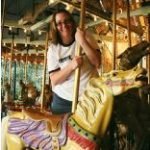
In the days leading up to the United States Barista Championship and the U.S. Brewer’s Cup, we at Barista Magazine are proud to share with you exclusive interviews with the six regional champions in each competition. We will feature the Southwestern Barista and Brewer’s Cup Champions; the Northwestern Barista and Brewers Cup Champions; the Southeast Barista and Brewers Cup Champions; the Northeastern Barista and Brewer’s Cup Champions; the South Central Barista and Brewers Cup Champions; and the North Central Regional Barista and Brewer’s Cup Champions on Tuesday. And stay tuned right here on Barista Magazine’s blog all next week for more of our preview coverage of all the exciting events and parties happening in Seattle in conjunction with the SCAA, and reports and photos of all the action every day through the end of this epic week in coffee.
Laila Ghambari
Director of Coffee
Cherry Street Coffee House
Seattle, Washington
When did you first get into coffee?
My first coffee job was working for my dad at Cherry Street. I used to go to work with him all the time when I was a little kid and do random jobs like bussing, ringing people up, etc. When I was 16 or 17, I actually started making coffee.

What was your first amazing experience with coffee?
I’m not sure I ever really had that big moment in coffee because I was around it so much, but I do remember the time in my life when I realized I really liked doing this and that I wanted to learn more and do more. It really happened when I left Cherry Street and branched out to other cafes and roasters. It’s nice to see it all come back full circle.

What was your first barista competition, and how many have you competed in since then?
First barista competition I participated in was the 2010 Northwest Regional Barista Competition (NWRBC) during Coffee Fest Seattle. I was working at the Urban Coffee Lounge and my co worker Andrew Milstead and I competed. I ended up getting third. I then did the United States Barista Championship (USBC) that year, and did the same thing in 2011 and 2012. I took last year off to judge and coach and now I’m back! I like to count [how many barista competitions I’ve participated in by] score sheets however, and I have 13 sets [of scoresheets ”thus 13 competitions].

Will you change things up for the USBC?
No. No. No. That is something I have learned from past competitions. I will take the judges’ feedback and only change those things. Everything else stays put.


Tell us about the coffee you used and why it’s so special to you.
Oh, boy. This coffee. I went to El Salvador and hung out with Emilio Lopez Diaz on his farm, El Manzano, for a week. I learned so much. He also owns the mill and I was able to see every single step. Emilio is brilliant. I mean, like, really, really smart. We ended up with three coffees, same variety, but different processes.

With so much experience in barista competitions, what did you do differently this time?
I didn’t over practice. I used to burn myself out. Spend hours in a lab doing nothing productive. This time, I thought about it for a long time first. Then went straight into full run-throughs about two weeks before and visualized my routine a lot. I only physically did a full run through about four times before my competition slot, but I bet I did it over 100 in my head.

You recently left Caffe Ladro to go back to your family company, Cherry Street. How’s that going? What are your job duties?
My title is Director of Coffee, and coffee is my main focus, but I’m doing a little bit of everything. Product development, retail experience, merchandising, social media, etc. I’m learning a lot and taking it one day at a time. I feel a lot of pressure since it’s my family, but I also have a lot of support because of that, as well. I’m really excited for the future of Cherry Street.

The Iranian Barista Guild people are probably flipping out right now with excitement for you. Your coffee success has inspired them so much. Why has it been important to you to work with them and help them get a foot hold in the international coffee industry?
I’m all about community. I’ve really given a lot of myself to the Seattle coffee community and the barista community in general. It’s rewarding, and I get so much in return. With Iran, I felt like I had to give them that same attention. That is my heritage, my people, my family. I wanted to see them succeed. All they really needed was someone to believe in them and support them. I really have not done much, it’s all their work. It’s very impressive. They just needed a little push. They look at my success as their success, and that feels really good.

Tell me how you feel about winning the Ecuador trip from Café Imports ”it’s such a super special prize.
I really believe that baristas going to origin is the best learning opportunity imaginable. I cannot express my gratitude enough to Café Imports for giving so many people this opportunity. I’ve been to origin but not with other baristas, and I’m really looking forward to that experience.


